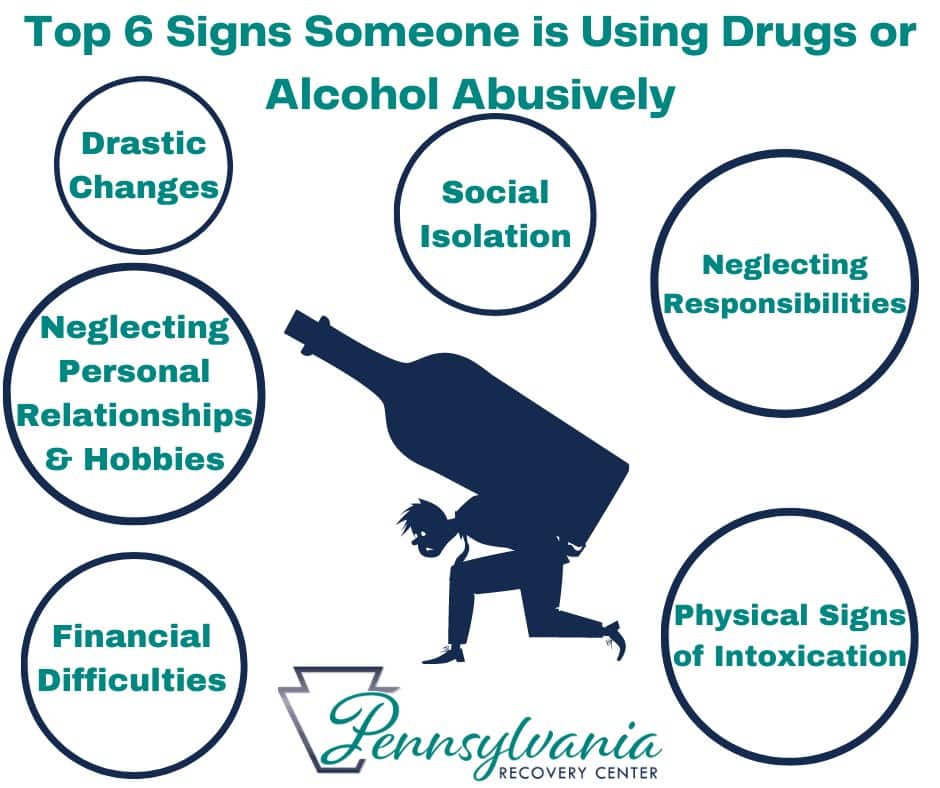
Substance Use Disorder is a pressing issue that affects millions of individuals worldwide, cutting across all demographics and social strata. Recognizing the signs and symptoms of drug and alcohol addiction is crucial for early intervention and improved treatment outcomes. In this comprehensive guide, we will delve into the physical, behavioral, and psychological indicators of substance abuse, empowering you to identify potential problems and seek help for yourself or a loved one. If you uncover they have these signs it might be a good time to check out a detox or outpatient program for them.
Physical Indicators:
- Dramatic changes in weight: Sudden weight loss or gain can be an alarming sign of substance abuse. Drugs or alcohol can disrupt appetite and metabolism, leading to rapid shifts in body weight.
- Bloodshot or glazed eyes: Frequent redness, glassy or watery eyes, and dilated or constricted pupils can indicate drug or alcohol intoxication.
- Physical tremors or unsteady movements: Shaking hands, uncoordinated motor skills, and difficulty maintaining balance are common physical manifestations of substance abuse.
- Frequent nosebleeds or runny nose: Nosebleeds and nasal congestion can occur with certain drug abuse, particularly those that are inhaled or snorted.
Behavioral Indicators:
- Drastic changes in social circles: A sudden withdrawal from long-standing friendships or the emergence of new, unfamiliar acquaintances may signify involvement in substance abuse.
- Increased secrecy and isolation: Individuals struggling with addiction often exhibit secretive behaviors, such as hiding substance use, withdrawing from social activities, or isolating themselves from family and friends.
- Decline in performance or attendance: A decline in work, school, or other responsibilities can be indicative of substance abuse interfering with one's ability to meet obligations.
- Financial difficulties: Substance abuse can lead to financial strain due to the costs associated with obtaining drugs or alcohol. Look for signs of unexplained financial hardships, unpaid bills, or frequent borrowing.
Psychological Indicators:
- Mood swings and erratic behavior: Rapid shifts in mood, unexplained anger, irritability, or agitation may point to substance abuse.
- Changes in sleep patterns: Insomnia, excessive sleepiness, or irregular sleep patterns can indicate substance abuse interfering with normal sleep cycles.
- Lack of motivation and decreased interest: A noticeable decline in motivation, loss of interest in hobbies or activities once enjoyed, and a general sense of apathy may be signs of substance abuse.
- Anxiety, depression, or paranoia: Substance abuse can exacerbate or trigger mental health conditions. Look for signs of heightened anxiety, persistent sadness, or unwarranted fearfulness.
Seeking Help and Early Intervention: Early intervention is crucial for successful addiction treatment. If you or someone you know is exhibiting signs of substance abuse, it's essential to take the following steps:
- Educate yourself: Learn about addiction, its consequences, and available treatment options. Resources from reputable organizations such as the National Institute on Drug Abuse (NIDA) or Substance Abuse and Mental Health Services Administration (SAMHSA) can provide valuable information.
- Encourage open dialogue: Approach the individual with compassion and empathy. Create a safe space for open and honest communication without judgment or criticism.
- Offer support and resources: Provide information about local treatment centers, counseling services, and support groups. Encourage them to seek professional help and offer to accompany them to appointments if desired.
- Involve a healthcare professional: Consult with a healthcare provider, therapist, or addiction specialist who can conduct an assessment, provide guidance, and recommend appropriate treatment options.
Understanding the signs and symptoms of substance abuse is a critical step toward early intervention and recovery. By recognizing the physical, behavioral, and psychological indicators, you can play a pivotal role in supporting yourself or someone you care about.


